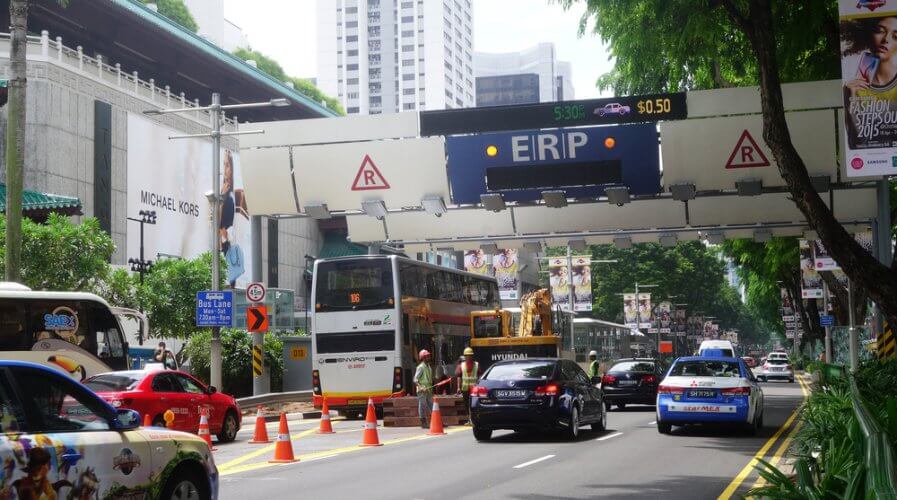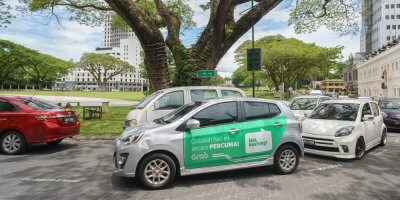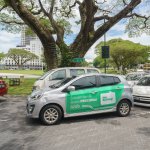
Singapore is going to be better at managing traffic soon. Source: Shutterstock
Forget Grab, oBike. Mobility as a Service to debut in Singapore
GRAB has been having trouble in Southeast Asia, especially in Singapore where the government found that consumers and drivers had been negatively affected by the deal that made it a monopoly in the country (and the region).
However, new apps — local and foreign — hope to ease the tension in the island nation and aim to lower regulatory concerns about rising traffic.
According to The Nikkei Asian Review, Finnish mobility service provider Maas Global and local startup mobilityX are working on all-in-one “transport apps” to tackle the transportation problem in a more comprehensive manner.
Essentially, the idea is to bring public transport companies, ride-hailing companies, and bike sharing companies, all on one common platform to help commuters find the fastest route to their destination — at a fare that’s economical, while using those modes of transport that least aggravate the traffic situation in the country.
It’s not an easy task, but it’s a step in the right direction — something that Uber and Lyft are already trying to do in the US.
Earlier this year, both companies announced plans to add cycles to their fleet of cabs serving customers whenever they stepped out of the house. In fact, Uber even tied with up with Masabi to enable users to book and display public transit tickets within the app, facilitating seamless multimodal journeys.
“Having a greater variety of transportation modes at your fingertips helps make it increasingly easy to live without a car. That’s why we want to provide alternatives to personal car ownership by bringing together multiple modes of transportation right in our app,” Uber’s Head of Product, Mobility Jahan Khanna said when the tie-up was announced.
Clearly, Uber and Lyft hope to be able to build an end-to-end platform that takes care of a commuter’s ‘mobility’ needs, whatever they might be — and new players in Singapore are going in that direction as well.
Mobility as a Service
Technically speaking, these “integrated” platforms understand the needs of new age users and the cities they live in.
The model these platforms operate on is called “Mobility as a Service” (MaaS) — which inspired the Finnish company to pick the name Maas Global — and they aim to link up different modes of transport to make journeys more seamless.
When discussing MaaS, Deloitte‘s consultants tend to set the stage by asking: If Netflix’s business model were applied to urban transportation, how might that change the way city dwellers get around?
To be honest, MaaS isn’t just a plug-and-play solution like Grab and the other ride-hailing and ride-sharing solutions. Instead, it requires a fair bit of planning and deliberation in order to implement in a city.
“MaaS is a data-driven, user-centered paradigm, powered by the growth of smartphones. To work effectively, MaaS would require the following conditions: widespread penetration of smartphones on 3G/4G/5G networks; high levels of connectivity; secure, dynamic, up-to-date information on travel options, schedules, and updates; and cashless payment systems,” pointed out Deloitte in a recent whitepaper.
“To enable these conditions, a diverse range of actors would need to cooperate: mobility management players, telcos, payment processors, public and private transportation providers, and local authorities with responsibility for transportation and city planning,” they added.
Based on those parameters, Singapore seems like the perfect destination for MaaS to make a debut and create a successful use case before it can spread to other parts of Southeast Asia where implementation will take (a lot) more work.
In Singapore, Maas Global is partnering with ComfortDelGro, the city-state’s largest taxi operator to bring the service to life. Hong Kong and Kuala Lumpur could be next — given the focus of their respective governments and available infrastructure — although no official announcement has been made to this effect.
READ MORE
- The criticality of endpoint management in cybersecurity and operations
- Ethical AI: The renewed importance of safeguarding data and customer privacy in Generative AI applications
- How Japan balances AI-driven opportunities with cybersecurity needs
- Deploying SASE: Benchmarking your approach
- Insurance everywhere all at once: the digital transformation of the APAC insurance industry




